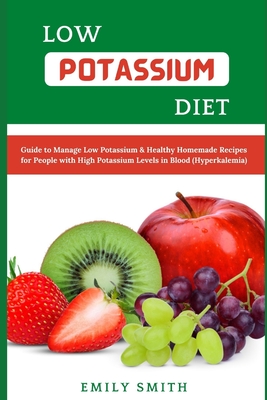Low Potassium Diet: Guide to Manage Low Potassium & Healthy Homemade Recipes for People with High Potassium Levels in Blood (Hyperkalemia)

Low Potassium Diet: Guide to Manage Low Potassium & Healthy Homemade Recipes for People with High Potassium Levels in Blood (Hyperkalemia)
Low potassium-occurs when blood levels of potassium are lower than normal. Normal
potassium values can vary somewhat from one lab to another. When a lab reports a
potassium level, it will provide a reference range along with it. This is the
normal range for potassium levels at that lab. Generally, a normal potassium level
is between 3.6 and 5.2 mEq/L (the lab may express it as mmoles/L).
Potassium is an electrolyte and mineral you get from food in your diet. It plays
an important role in nerve and muscle cell function. Like other muscles in your
body, your heart muscle needs potassium to work properly. Low potassium levels can
interfere with the heart and cause abnormal heart rhythms. Other hypokalemia
symptoms include fatigue, weakness, muscle cramps, and constipation. Mild cases
may not have any symptoms.
Common symptoms: ConstipationFatigueMuscle weakness, cramps or twitchesNumbness or tingling
What is low potassium (hypokalemia)?
Hypokalemia-or low potassium-occurs when blood levels of potassium are lower than
normal. Normal potassium values can vary somewhat from one lab to another. When a
lab reports a potassium level, it will provide a reference range along with it.
This is the normal range for potassium levels at that lab. Generally, a normal
potassium level is between 3.6 and 5.2 mEq/L (the lab may express it as mmoles/L).
The most common cause of low potassium is excessive potassium loss through the
urine or digestive tract. The risk of this increases for people on diuretics or
with prolonged vomiting or diarrhea. Eating disorders and laxative overuse can
also increase the risk of low potassium.
Hypokalemia treatment depends on the severity of the problem and the underlying
cause. Mild depletions may only require a potassium-rich diet. Potassium
supplements can help people who need more than they can get from diet alone. Very
low potassium levels require immediate medical treatment with an IV (intravenous)
potassium solution.
Low potassium usually shows up on a blood test. Doctors may order a potassium
level as part of routine care or if you have an illness or take diuretics. When
symptoms develop, it can become life threatening. Seek immediate medical care
(call 911) if you develop heart palpitations, confusion, paralysis, excessive
thirst or urination, or any other symptoms of low potassium.
Scroll up, click on ''Buy Now w
Descrierea produsului
Low potassium-occurs when blood levels of potassium are lower than normal. Normal
potassium values can vary somewhat from one lab to another. When a lab reports a
potassium level, it will provide a reference range along with it. This is the
normal range for potassium levels at that lab. Generally, a normal potassium level
is between 3.6 and 5.2 mEq/L (the lab may express it as mmoles/L).
Potassium is an electrolyte and mineral you get from food in your diet. It plays
an important role in nerve and muscle cell function. Like other muscles in your
body, your heart muscle needs potassium to work properly. Low potassium levels can
interfere with the heart and cause abnormal heart rhythms. Other hypokalemia
symptoms include fatigue, weakness, muscle cramps, and constipation. Mild cases
may not have any symptoms.
Common symptoms: ConstipationFatigueMuscle weakness, cramps or twitchesNumbness or tingling
What is low potassium (hypokalemia)?
Hypokalemia-or low potassium-occurs when blood levels of potassium are lower than
normal. Normal potassium values can vary somewhat from one lab to another. When a
lab reports a potassium level, it will provide a reference range along with it.
This is the normal range for potassium levels at that lab. Generally, a normal
potassium level is between 3.6 and 5.2 mEq/L (the lab may express it as mmoles/L).
The most common cause of low potassium is excessive potassium loss through the
urine or digestive tract. The risk of this increases for people on diuretics or
with prolonged vomiting or diarrhea. Eating disorders and laxative overuse can
also increase the risk of low potassium.
Hypokalemia treatment depends on the severity of the problem and the underlying
cause. Mild depletions may only require a potassium-rich diet. Potassium
supplements can help people who need more than they can get from diet alone. Very
low potassium levels require immediate medical treatment with an IV (intravenous)
potassium solution.
Low potassium usually shows up on a blood test. Doctors may order a potassium
level as part of routine care or if you have an illness or take diuretics. When
symptoms develop, it can become life threatening. Seek immediate medical care
(call 911) if you develop heart palpitations, confusion, paralysis, excessive
thirst or urination, or any other symptoms of low potassium.
Scroll up, click on ''Buy Now w
Detaliile produsului












